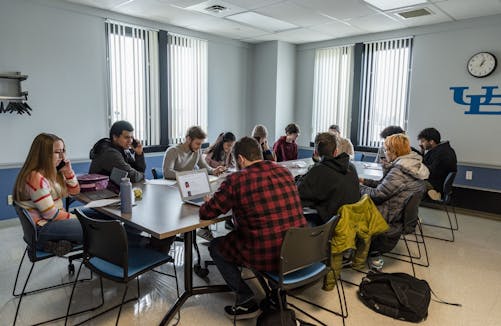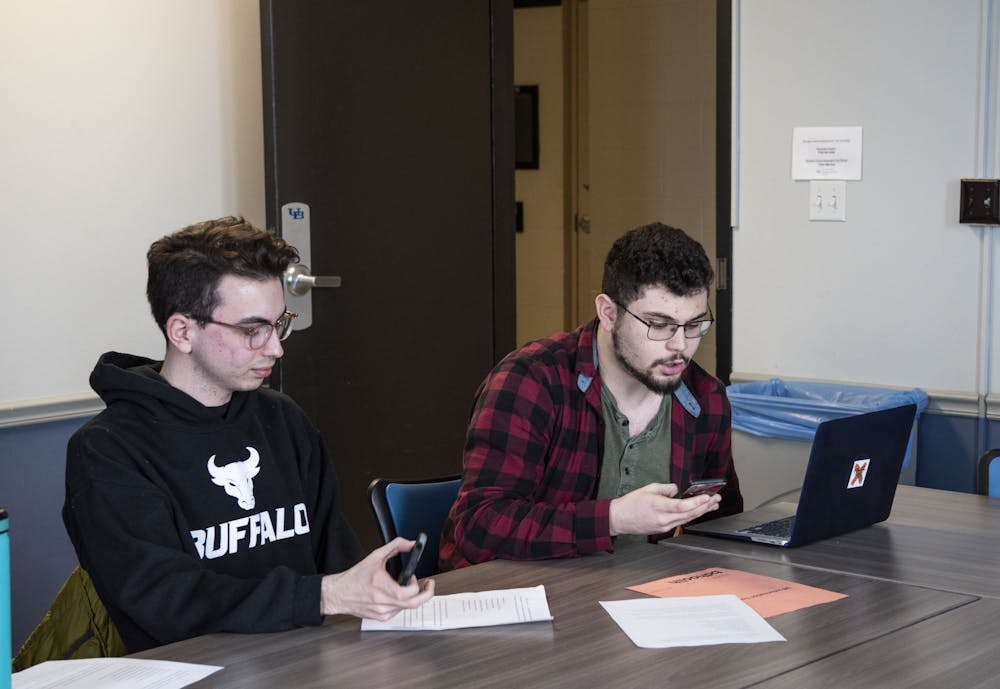Students called the UB Foundation (UBF) over 100 times Wednesday, urging it to “completely divest” from all investments related to the fossil fuel industry.
UB Divest organized the phone-banking drive to ask UBF to “stop investing in fossil fuels". Participants in the phone-banking drive said they believe UBF still has investments in the fossil fuel industry because it never made a statement declaring that it doesn’t.
Roughly 30 students met in Student Union 317 to participate in UB Divest’s –– a student-led coalition composed of organizations like UB College Democrats, UB Young Democratic Socialists of America and UB Environmental Network –– event.
Brandon Hoolihan, president of UB College Democrats, criticized UB’s public commitment to sustainability and UBF’s alleged investments.
“It is impossible to truly be committed to sustainability when financially supporting industries that threaten environmental sustainability,” Hoolihan said. “The university’s silence on the foundation’s continued use of university funds to support fracking companies is hypocritical in and of itself.”
Students each called the offices of six UBF directors once and recited a prepared script when a UBF receptionist answered their calls or directed them to voicemail.
UBF Executive Director Ed Schneider wrote over email that UBF is “developing a responsible investment statement” that will “define the approach for consideration of environmental, social and governance (ESG) factors within UBF’s investment strategy.”
Schneider wrote that, while UBF provides support for students in the form of scholarships, fellowships, awards and through other ways, UBF “doesn’t comment on specific investments in its portfolio.”
“UBF is very focused on developing responsible investment strategies and practices, that includes taking into consideration environmental, social and governance factors,” Schneider wrote.
Hayden Gise, chairperson of the Student Association’s board of directors, said when they called UBF’s main office, the receptionist “criticized” and “questioned” them about their lifestyle.
“I was met with criticism, critique and was questioned on my own lifestyle and how I reconcile with my own carbon footprint,” Gise said. “I feel that is not really productive to the conversation. … It was just kind of sad to hear that that was [UBF’s] response to hearing how they can do better: to try and say that we, the students, are s--theads.”
At least two other callers reported similar responses.
Sasha Shapiro, a computer science student who participated in UB Divest’s phone banking drive, said it was not appropriate to “draw an equivalence” between students’ lifestyles and UBF’s alleged investments in the fossil fuel industry.
“I think it’s funny and childish that the people we are calling keep trying to draw an equivalence between college students buying clothes or driving to class, and UB investing in fossil fuel companies and hydrofracking,” Shapiro said.
The UBF main office receptionist, who did not wish to disclose her name, said the amount of calls she received Wednesday was “uncalled for.”
“We are getting inundated with many, many calls,” the receptionist told The Spectrum. “It’s not just one or two calls. It was like a robocall. I have received 26 calls in 13 minutes and that’s uncalled for. My response to them is if you’re going to preach to me, you better live that life. If [you] talk the talk, walk the walk. And that was my response to them.”

UB Divest organized a phone banking drive to encourage the UB Foundation to cease investments in the fossil fuel industry.
UBF has faced criticism from students in the past, most notably in 2015, when UB Fossil Free formed to urge UBF to “divest” from the fossil fuel industry.
Although UBF is independent from the university, UB President Satish Tripathi serves on UBF’s board of trustees and four other members of UB’s administration, including Provost A. Scott Weber, are non-voting members of UBF’s board of directors.
UB spokesperson John DellaContrada said UB has demonstrated “a real and true commitment to sustainability.”
“The university is far from silent on the topic of sustainability,” DellaContrada wrote in an email. “In fact, UB is a national leader in sustainability, as demonstrated by the fact that 100% of the electricity that UB uses comes from clean, renewable sources and that UB has decreased its overall carbon footprint by 35% over the past 10 years. ... Even with this progress, the university recognizes that more needs to be done. We will keep moving forward to become even more sustainable, in collaboration with our students and faculty and staff, in order to address one of the most pressing challenges of our time.”
Hoolihan said that even though UBF is separate, UB should still be accountable for UBF’s investments and if UBF is investing in the fossil fuel industry, that would undermine UB’s commitment to sustainability.
“[UBF] is investing UB’s endowment, which is UB’s money,” Hoolihan said. “So if you’re investing UB’s money into fossil fuels, that is essentially the same thing as UB investing in fossil fuels. The only difference is that they are going through one extra step of having a different organization do the same exact thing.”
Hoolihan said UBF receptionists did not listen to all of the students’ requests but he thinks UB Divest was able to convey its message.
“Personally I think this is actually a good thing,” Hoolihan said. “It shows that this is successful and that the UB Foundation is getting the message and that they’re understanding that we are going to keep calling them.”
Sadie Kratt, president of UB Environmental Network and SA’s director of environmental affairs, said she thought phone banking was an effective method of activism because it allowed UB Divest to “directly interact” with UBF’s board. Kratt said she expects that Wednesday’s phone banking drive had a more significant impact than protests that took place in the recent past.

President of environmental network and director of environmental affairs for the undergraduate student association, Sadie Kratt, talks about the UB Foundation’s investments in fossil fuel industry.
“While these kinds of events like phone banking and email banking don’t get as big of a turnout and it doesn’t seem as dramatic as a protest, it really does a little bit more because you directly interact with the board,” Kratt said.
Kratt said "divesting" from the fossil fuel industry is an important step in the effort to combat climate change.
“If the fossil fuel companies don’t have the money to keep going that’s how you make a change and stop the whole system.”
Julian Roberts-Grmela is a senior news editor and can be reached at julian.grmela@ubspectrum.com and on Twitter @GrmelaJulian.

Julian Roberts-Grmela is a senior news editor for The Spectrum and an English and philosophy major. His favorite book is “White Teeth” by Zadie Smith and he hopes that one day his writing will be as good as hers.





